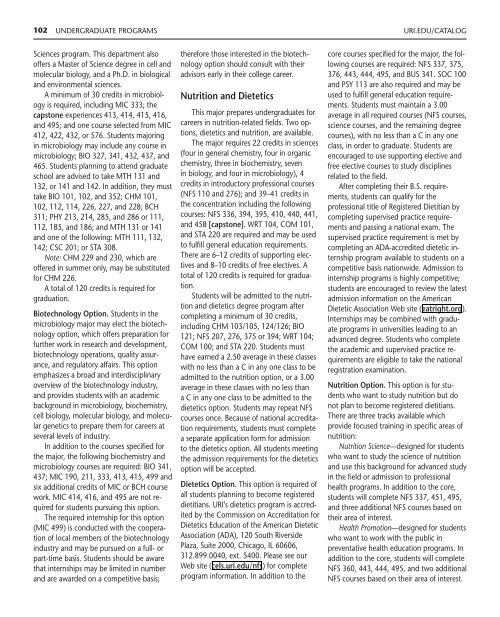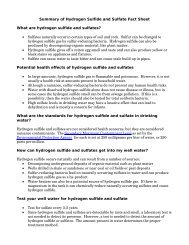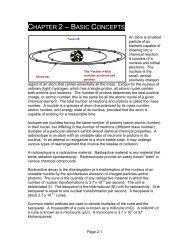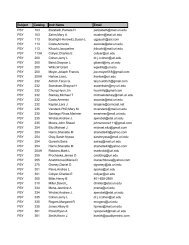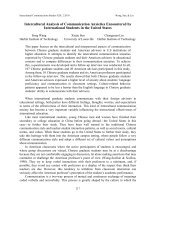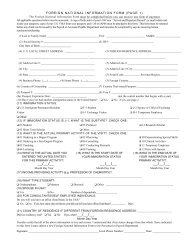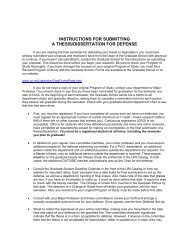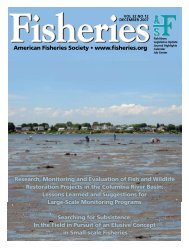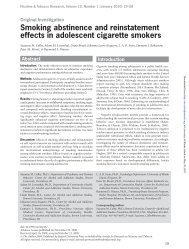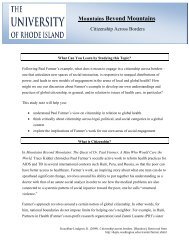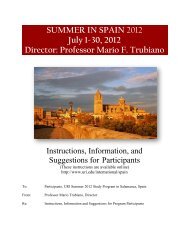UNDERGRADUATE PROGRAMS The - University of Rhode Island
UNDERGRADUATE PROGRAMS The - University of Rhode Island
UNDERGRADUATE PROGRAMS The - University of Rhode Island
You also want an ePaper? Increase the reach of your titles
YUMPU automatically turns print PDFs into web optimized ePapers that Google loves.
102 <strong>UNDERGRADUATE</strong> <strong>PROGRAMS</strong> URI.EDU/CATALOG<br />
Sciences program. This department also<br />
<strong>of</strong>fers a Master <strong>of</strong> Science degree in cell and<br />
molecular biology, and a Ph.D. in biological<br />
and environmental sciences.<br />
A minimum <strong>of</strong> 30 credits in microbiology<br />
is required, including MIC 333; the<br />
capstone experiences 413, 414, 415, 416,<br />
and 495; and one course selected from MIC<br />
412, 422, 432, or 576. Students majoring<br />
in microbiology may include any course in<br />
microbiology; BIO 327, 341, 432, 437, and<br />
465. Students planning to attend graduate<br />
school are advised to take MTH 131 and<br />
132, or 141 and 142. In addition, they must<br />
take BIO 101, 102, and 352; CHM 101,<br />
102, 112, 114, 226, 227, and 228; BCH<br />
311; PHY 213, 214, 285, and 286 or 111,<br />
112, 185, and 186; and MTH 131 or 141<br />
and one <strong>of</strong> the following: MTH 111, 132,<br />
142; CSC 201; or STA 308.<br />
Note: CHM 229 and 230, which are<br />
<strong>of</strong>fered in summer only, may be substituted<br />
for CHM 226.<br />
A total <strong>of</strong> 120 credits is required for<br />
graduation.<br />
Biotechnology Option. Students in the<br />
microbiology major may elect the biotechnology<br />
option, which <strong>of</strong>fers preparation for<br />
further work in research and development,<br />
biotechnology operations, quality assurance,<br />
and regulatory affairs. This option<br />
emphasizes a broad and interdisciplinary<br />
overview <strong>of</strong> the biotechnology industry,<br />
and provides students with an academic<br />
background in microbiology, biochemistry,<br />
cell biology, molecular biology, and molecular<br />
genetics to prepare them for careers at<br />
several levels <strong>of</strong> industry.<br />
In addition to the courses specified for<br />
the major, the following biochemistry and<br />
microbiology courses are required: BIO 341,<br />
437; MIC 190, 211, 333, 413, 415, 499 and<br />
six additional credits <strong>of</strong> MIC or BCH course<br />
work. MIC 414, 416, and 495 are not required<br />
for students pursuing this option.<br />
<strong>The</strong> required internship for this option<br />
(MIC 499) is conducted with the cooperation<br />
<strong>of</strong> local members <strong>of</strong> the biotechnology<br />
industry and may be pursued on a full- or<br />
part-time basis. Students should be aware<br />
that internships may be limited in number<br />
and are awarded on a competitive basis;<br />
therefore those interested in the biotechnology<br />
option should consult with their<br />
advisors early in their college career.<br />
Nutrition and Dietetics<br />
This major prepares undergraduates for<br />
careers in nutrition-related fields. Two options,<br />
dietetics and nutrition, are available.<br />
<strong>The</strong> major requires 22 credits in sciences<br />
(four in general chemistry, four in organic<br />
chemistry, three in biochemistry, seven<br />
in biology, and four in microbiology), 4<br />
credits in introductory pr<strong>of</strong>essional courses<br />
(NFS 110 and 276); and 39–41 credits in<br />
the concentration including the following<br />
courses: NFS 336, 394, 395, 410, 440, 441,<br />
and 458 [capstone]. WRT 104, COM 101,<br />
and STA 220 are required and may be used<br />
to fulfill general education requirements.<br />
<strong>The</strong>re are 6–12 credits <strong>of</strong> supporting electives<br />
and 8–10 credits <strong>of</strong> free electives. A<br />
total <strong>of</strong> 120 credits is required for graduation.<br />
Students will be admitted to the nutrition<br />
and dietetics degree program after<br />
completing a minimum <strong>of</strong> 30 credits,<br />
including CHM 103/105, 124/126; BIO<br />
121; NFS 207, 276, 375 or 394; WRT 104;<br />
COM 100; and STA 220. Students must<br />
have earned a 2.50 average in these classes<br />
with no less than a C in any one class to be<br />
admitted to the nutrition option, or a 3.00<br />
average in these classes with no less than<br />
a C in any one class to be admitted to the<br />
dietetics option. Students may repeat NFS<br />
courses once. Because <strong>of</strong> national accreditation<br />
requirements, students must complete<br />
a separate application form for admission<br />
to the dietetics option. All students meeting<br />
the admission requirements for the dietetics<br />
option will be accepted.<br />
Dietetics Option. This option is required <strong>of</strong><br />
all students planning to become registered<br />
dietitians. URI’s dietetics program is accredited<br />
by the Commission on Accreditation for<br />
Dietetics Education <strong>of</strong> the American Dietetic<br />
Association (ADA), 120 South Riverside<br />
Plaza, Suite 2000, Chicago, IL 60606,<br />
312.899.0040, ext. 5400. Please see our<br />
Web site (cels.uri.edu/nfs) for complete<br />
program information. In addition to the<br />
core courses specified for the major, the following<br />
courses are required: NFS 337, 375,<br />
376, 443, 444, 495, and BUS 341. SOC 100<br />
and PSY 113 are also required and may be<br />
used to fulfill general education requirements.<br />
Students must maintain a 3.00<br />
average in all required courses (NFS courses,<br />
science courses, and the remaining degree<br />
courses), with no less than a C in any one<br />
class, in order to graduate. Students are<br />
encouraged to use supporting elective and<br />
free elective courses to study disciplines<br />
related to the field.<br />
After completing their B.S. requirements,<br />
students can qualify for the<br />
pr<strong>of</strong>essional title <strong>of</strong> Registered Dietitian by<br />
completing supervised practice requirements<br />
and passing a national exam. <strong>The</strong><br />
supervised practice requirement is met by<br />
completing an ADA-accredited dietetic internship<br />
program available to students on a<br />
competitive basis nationwide. Admission to<br />
internship programs is highly competitive;<br />
students are encouraged to review the latest<br />
admission information on the American<br />
Dietetic Association Web site (eatright.org).<br />
Internships may be combined with graduate<br />
programs in universities leading to an<br />
advanced degree. Students who complete<br />
the academic and supervised practice requirements<br />
are eligible to take the national<br />
registration examination.<br />
Nutrition Option. This option is for students<br />
who want to study nutrition but do<br />
not plan to become registered dietitians.<br />
<strong>The</strong>re are three tracks available which<br />
provide focused training in specific areas <strong>of</strong><br />
nutrition:<br />
Nutrition Science—designed for students<br />
who want to study the science <strong>of</strong> nutrition<br />
and use this background for advanced study<br />
in the field or admission to pr<strong>of</strong>essional<br />
health programs. In addition to the core,<br />
students will complete NFS 337, 451, 495,<br />
and three additional NFS courses based on<br />
their area <strong>of</strong> interest.<br />
Health Promotion—designed for students<br />
who want to work with the public in<br />
preventative health education programs. In<br />
addition to the core, students will complete<br />
NFS 360, 443, 444, 495, and two additional<br />
NFS courses based on their area <strong>of</strong> interest.


